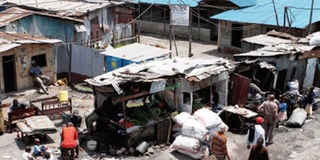Provincial Administration to blame for slum expansion

Traders at work in Mukuru Kwa Reuben slums in Nairobi. Photo/STEPHEN MUDIARI/
What you need to know:
- Provincial administration has fuelled the expansion of slums by leasing out public and unclaimed private land to traders
When he wanted to put up a second-hand clothes shop on the edges of a perimeter wall of a plot whose owner had not been seen in years in Imara Daima, Nairobi, Mr John Omwenga approached the area chief for permission.
In exchange for a small token and a monthly cut from the business, the chief granted Mr Omwenga his wish. The administrator also assured the businessman of security and protection from interference by Nairobi City Council askaris.
“It was a perfect deal for us all,” the 27-year old Kenya Polytechnic graduate told the Nation last week. “I have been looking for work for four years in vain, and the chief helped me to be my own man financially.”
But soon afterwards, other traders joined him and the perimeter wall was pulled down, exposing the plot. Then one day one of the traders set up a shack inside the plot to keep his stock. Quite predictably one thing led to another and plot is now fully occupied by an estimated 80 families.
Wherever he is, the owner of the plot is undoubtedly a sad man but the chief is getting richer by the day.
“He collects rent (through an intermediary) from all of us here,” said Mr Omwenga.
The case in itself highlights the role the provincial administration has played over the years in the evolution of the slum problem in Kenya.
The Ruben Centre in Mukuru Kwa Reuben slums is another example.
When the officials of the centre, which includes a hospital, a school and a police post, petitioned the commissioner of lands to be granted permanent ownership of the plot, now owned by Lugari MP Cyrus Jirongo, they stated that they had been granted temporary occupation of the land by the district commissioner of Embakasi.
By facilitating the grabbing and illegal allocation of public properties in slums, the provincial administration has led the way for massive corruption that has become the order of the day in the informal settlements.
Much of this politically instigated allocations of land were made public in 2003 by the Ndung’u Land Commission.
It found out that more than 200,000 illegal titles were created between 1962 and 2002 on the orders of the President, senior public officials and politicians.
The motives behind these illegal land allocations were not just personal enrichment but political in nature because land grabbing increased around the time of elections, according to the commission report.
The commission found out that, in line with the interest group model, beneficiaries of grabbed land were ministers, senior civil servants, politicians and politically well-connected businessmen.
The provincial administration, represented by local chiefs, reportedly allocated public or unclaimed private land in slums to private individuals and firms (Centre on Housing Rights and Evictions (COHRE), 84-85; Syagga et al., 2001, 78).
This quasi-legal security of tenure has kept millions of slum dwellers at the mercy of chiefs and DCs, which makes them vulnerable to moneyed land grabbers.
Thus, slums may be referred to as informal settlements not only because the unplanned housing but also because the allocation of land has no legal basis.
As a result of the distorted land allocation, 92 per cent of the slum households in Nairobi are rent-paying tenants (World Bank, 2006, 36). This has turned slums, which were historically located on public land, into private properties that operate like the formal real estate sector.
The government has taken no noticeable measures to improve governance in the settlements.
The provincial administration still enjoys significant formal and de facto powers in the settlements without any clear mechanisms of accountability to local communities or even Parliament, since chiefs, DOs and DCs report directly to the President.
This has seen slum dwellers in Korogocho organise accountability sessions for the local council and the provincial administration to question them on the allocation of resources in their area.




